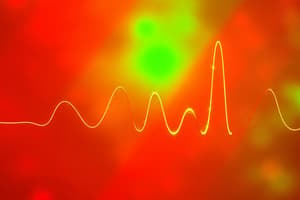Podcast
Questions and Answers
What is the constant represented by the symbol R?
What is the constant represented by the symbol R?
- Planck's constant
- Angular momentum constant
- Bohr's constant
- Rydberg constant (correct)
What is the name of the series of lines observed in the infrared region of the spectrum?
What is the name of the series of lines observed in the infrared region of the spectrum?
- Balmer series
- Humphries series
- Brackett series (correct)
- Pfund series (correct)
What did Bohr's theory provide a link to?
What did Bohr's theory provide a link to?
- Atomic spectra and Planck's constant (correct)
- Atomic structure and Rutherford's model
- Atomic spectra and Rutherford's model
- Atomic structure and Planck's theory
What is the assumption in Bohr's theory regarding angular momentum of the electron?
What is the assumption in Bohr's theory regarding angular momentum of the electron?
What is the name of the physicist who studied under Rutherford at the Victoria University in Manchester?
What is the name of the physicist who studied under Rutherford at the Victoria University in Manchester?
What is the concept introduced by Bohr in his model of the atom?
What is the concept introduced by Bohr in his model of the atom?
What is the name of the theory that states energy is not continuous but discrete?
What is the name of the theory that states energy is not continuous but discrete?
What is the shape of the orbits in Bohr's model of the atom?
What is the shape of the orbits in Bohr's model of the atom?
What is the net charge of a cation?
What is the net charge of a cation?
What happens when a neutral atom loses one or more electrons?
What happens when a neutral atom loses one or more electrons?
What is the wavelength of radiation emitted for the electronic transition from infinite to stationary state of hydrogen atom?
What is the wavelength of radiation emitted for the electronic transition from infinite to stationary state of hydrogen atom?
What is the energy of the electron in the first orbit of a hydrogen atom?
What is the energy of the electron in the first orbit of a hydrogen atom?
What is the radius of Bohr's first orbit for a hydrogen atom?
What is the radius of Bohr's first orbit for a hydrogen atom?
What is the net charge of an anion?
What is the net charge of an anion?
Who proposed elliptical orbits instead of circular orbits?
Who proposed elliptical orbits instead of circular orbits?
What is observed when atomic spectra lines are in the presence of an applied magnetic field?
What is observed when atomic spectra lines are in the presence of an applied magnetic field?
What is a limitation of the Sommerfeld theory?
What is a limitation of the Sommerfeld theory?
Who suggested that all matter could exhibit wave-like properties?
Who suggested that all matter could exhibit wave-like properties?
What is the equation that expresses energy in terms of wave properties?
What is the equation that expresses energy in terms of wave properties?
What is the Heisenberg Uncertainty Principle related to?
What is the Heisenberg Uncertainty Principle related to?
What is the significance of the constant 'h' in the equation λ = h/p?
What is the significance of the constant 'h' in the equation λ = h/p?
What is the relationship between the momentum and wavelength of a moving electron?
What is the relationship between the momentum and wavelength of a moving electron?
What is the value of n in the Bohr model?
What is the value of n in the Bohr model?
What happens to the energy of an electron when it is in a particular orbit?
What happens to the energy of an electron when it is in a particular orbit?
What is the name of the series of spectroscopic lines observed when an electron returns to the ground state?
What is the name of the series of spectroscopic lines observed when an electron returns to the ground state?
What is the relationship between the energy of an electron and its distance from the nucleus?
What is the relationship between the energy of an electron and its distance from the nucleus?
What is the term for the paths in which electrons move around the nucleus?
What is the term for the paths in which electrons move around the nucleus?
What is the difference between a neutral atom and an ion?
What is the difference between a neutral atom and an ion?
What is the name of the constant that appears in the equation for the energy of an electron in the Bohr model?
What is the name of the constant that appears in the equation for the energy of an electron in the Bohr model?
What is the term for the definite energy associated with each stationary orbit?
What is the term for the definite energy associated with each stationary orbit?
What is the value of Z* for oxygen, given that Z = 8 and σ = 3.45?
What is the value of Z* for oxygen, given that Z = 8 and σ = 3.45?
What is the electron configuration of nitrogen in the Slater's Rule Calculation?
What is the electron configuration of nitrogen in the Slater's Rule Calculation?
What is the shielding constant experienced by a 2p electron in the nitrogen atom?
What is the shielding constant experienced by a 2p electron in the nitrogen atom?
What is the value of σ for a 3d electron in the bromine atom?
What is the value of σ for a 3d electron in the bromine atom?
What is the electron configuration of bromine in the Slater's Rule Calculation?
What is the electron configuration of bromine in the Slater's Rule Calculation?
What is the value of Z* for nickel, given that Z = 28 and σ = 20.45?
What is the value of Z* for nickel, given that Z = 28 and σ = 20.45?
What is the electron configuration of nickel in the Slater's Rule Calculation?
What is the electron configuration of nickel in the Slater's Rule Calculation?
What is the shielding constant for a 4s electron in nickel?
What is the shielding constant for a 4s electron in nickel?
Study Notes
Hydrogen Spectra
- The Rydberg formula describes the wavelengths of light emitted by hydrogen: ῡ = R (1/ni² - 1/nf²)
- The formula is used to calculate the wavelengths of spectral lines in different series (e.g. Lyman, Balmer, Paschen)
Bohr Model of the Atom
- Electrons exist in definite energy levels (quantized) and move between these levels, emitting or absorbing energy corresponding to specific frequencies
- The energy states of H atoms are quantized, and electrons jump between energy levels, emitting or absorbing energy
- Bohr's theory explains the atomic spectra and is linked to Planck's constant (h)
Bohr's Assumptions
- Electrons can have only specific (quantized) energy values
- The angular momentum of the electron must be quantized for each discrete orbit
Summary of Bohr Model
- Electrons move in specified paths (orbits or shells) around the nucleus
- As long as the electron is in a particular orbit, its energy is constant (stationary orbit or stationary shell)
- The principal quantum number (n) can take values 1, 2, 3, 4, etc.
- Each stationary orbit corresponds to a definite energy
Multielectron Atoms
- Neutral atoms have the same number of protons and electrons
- Ions are charged atoms (cations have more protons than electrons, anions have more electrons than protons)
Electrons in Orbit about the Nucleus
- Atomic Structure: Neutral atoms have the same number of protons and electrons
- Ion Formation: Neutral atoms can lose or gain electrons to become ions
Problems
- Wavenumber calculations for transitions from outer levels to level 2
- Radius of Bohr's first orbit for hydrogen atom and energy of the electron in the orbit
- Wavelength and energy of radiation emitted for electronic transitions from infinite to stationary state of hydrogen atom
Sommerfeld Theory (Bohr-Sommerfeld Theory)
- Arnold Sommerfeld proposed elliptical orbits instead of circular orbits
- Limitations: cannot explain fine structure, does not provide information on relativistic intensities of fine lines, and is contrary to the uncertainty principle
Wave-Particle Duality of Electron
- Louis Victor de Broglie suggested that all matter can exhibit wave-like properties
- Wave-particle duality of photon: E = hv = hc/λ
- Combining equations: λ = h/p (de Broglie wavelength)
Heisenberg Uncertainty Principle
- States that it is impossible to know both the momentum and position of a particle at the same time
- Critical for small particles like electrons
Slater's Rule Calculation
- Example calculations for oxygen and nickel atoms
- Calculating shielding constants (σ) for 2p and 3d electrons
Studying That Suits You
Use AI to generate personalized quizzes and flashcards to suit your learning preferences.
Description
This quiz covers the formula and equations related to the hydrogen spectra, including the Rydberg constant and wavelength of radiation.




